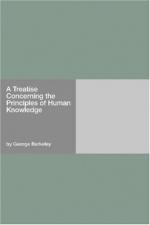103. Attraction signifies the effect, not the manner or cause.—The great mechanical principle now in vogue is attraction. That a stone falls to the earth, or the sea swells towards the moon, may to some appear sufficiently explained thereby. But how are we enlightened by being told this is done by attraction? Is it that that word signifies the manner of the tendency, and that it is by the mutual drawing of bodies instead of their being impelled or protruded towards each other? But, nothing is determined of the manner or action, and it may as truly (for aught we know) be termed “impulse,” or “protrusion,” as “attraction.” Again, the parts of steel we see cohere firmly together, and this also is accounted for by attraction; but, in this as in the other instances, I do not perceive that anything is signified besides the effect itself; for as to the manner of the action whereby it is produced, or the cause which produces it, these are not so much as aimed at.
104. Indeed, if we take a view of the several phenomena, and compare them together, we may observe some likeness and conformity between them. For example, in the falling of a stone to the ground, in the rising of the sea towards the moon, in cohesion, crystallization, etc, there is something alike, namely, an union or mutual approach of bodies. So that any one of these or the like phenomena may not seem strange or surprising to a man who has nicely observed and compared the effects of nature. For that only is thought so which is uncommon, or a thing by itself, and out of the ordinary course of our observation. That bodies should tend towards the centre of the earth is not thought strange, because it is what we perceive every moment of our lives. But, that they should have a like gravitation towards the centre of the moon may seem odd and unaccountable to most men, because it is discerned only in the tides. But a philosopher, whose thoughts take in a larger compass of nature, having observed a certain similitude of appearances, as well in the heavens as the earth, that argue innumerable bodies to have a mutual tendency towards each other, which he denotes by the general name “attraction,” whatever can be reduced to that he thinks justly accounted for. Thus he explains the tides by the attraction of the terraqueous globe towards the moon, which to him does not appear odd or anomalous, but only a particular example of a general rule or law of nature.
105. If therefore we consider the difference there is betwixt natural philosophers and other men, with regard to their knowledge of the phenomena, we shall find it consists not in an exacter knowledge of the efficient cause that produces them—for that can be no other than the will of a spirit—but only in a greater largeness of comprehension, whereby analogies, harmonies, and agreements are discovered in the works of nature, and the particular effects




